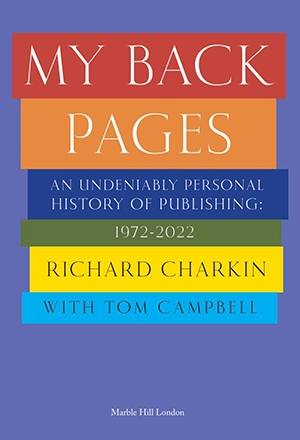‘My mum thought I’d be sent to jail’: Hackney author’s new memoir chronicles decades-long career in publishing – from controversial cult hits to phenomena like Harry Potter

Mensch founder Richard Charkin at work. Photograph: courtesy Richard Charkin
A former publishing executive who now single-handedly runs his own book business in Hackney has released a memoir of his career – with the founder of Waterstones calling it a “compulsory text”.
In My Back Pages, Richard Charkin charts his journey from editing by candlelight in the 1970s to senior roles at industry giants Bloomsbury and MacMillan, to later starting his own publishing house, Mensch.
His experiences of phenomena such as Harry Potter will no doubt be of great interest, but his knowledge of the social and technological shifts in the industry also make this one for writers, insiders and anyone considering a career in publishing.
Charkin co-wrote the book with his friend and fellow author Tom Campbell, mostly at Newington Green’s Mildmay Club, where they jotted down the stories they would go on to redraft by email over six months.
Charkin told the Citizen: “We suddenly had 60,000 words. People say Tom has really captured my voice which is great. We ended up being very selective and tried to get into the social changes as well as the business changes.
“When I look back on it, there have been enormous changes. Not just about technology but about how people live and behave.”

“I mean we really were a bunch of amateurs,” he said. “Today people are more professional at their expertise. For example, the publicity people are now publicity professionals, not like before. But very few people are all-rounders in publishing.”
A big difference back then was that the leadership team was entirely white men.
“I think the single biggest change is more women in the industry, which has worked terrifically well.”
Another shift covered in the book covers is the growing diversity in publishing and the benefits this brings – though the industry still has a long way to go.
Charkin said that while there is a much higher proportion of female and non-white authors today than ever before, the top-selling mainstream authors are still mostly white men from privileged backgrounds.
“And today the landscape is celebrity memoirs, cookery books, fiction and commercial fiction,” he explained. “In the 80s or 90s it was interesting that there was a significant growth in what might be described as literary fiction from the usual bunch of men and some women. I think this growth might have peaked. As kids have become less used to reading long novels, serious fiction may be under threat. Reading habits have changed since novels were the main source of culture in the 19th century.”
Charkin puts this down to the reduced role of public libraries compared to the 70s, when it was common for kids to visit once a week to borrow or return books.
Stories of cult hits also emerge in My Back Pages.
Charkin remembers when his employer bought the rights to Madonna’s controversial erotic photography book SEX in 1992. It was a risk that paid off, with the book selling out on the first day.
“My mum thought I’d be sent to jail because of the various religious groups in America trying to block the book,” he said.
Another of Charkin’s editorial accomplishments had an even bigger cultural effect. He is proud of the colossal task of digitalising the Oxford English Dictionary in 1988, which involved blending 10 editions from the early 1900s and later supplementary additions.
“It’s the only dictionary in any language of anything with this comprehensiveness and authority,” he said. “The French haven’t even got to ‘Z’ yet and started 150 years ago. The Germans got a bit stuck at ‘S’ because ‘S’ is every other word.”
Bookshops and literary figures have been singing the praises of My Back Pages.
Sir Tom Waterstone, founder of Waterstones, said: “Charkin’s opinionated anecdotes and reflections provide intriguing colour and pace, and are sometimes very funny, but it is his technical overview of the market over these five decades of constant technical revolution that is so absorbing, so clear-minded, so wide-flung, so instructive.
“My Back Pages should now become a compulsory text for new career entrants into the publishing world. It’s that good.”
